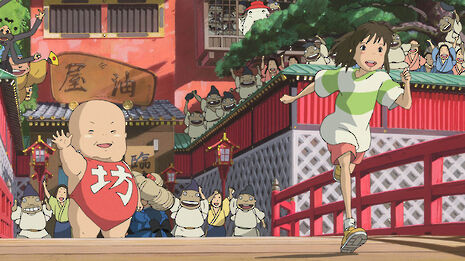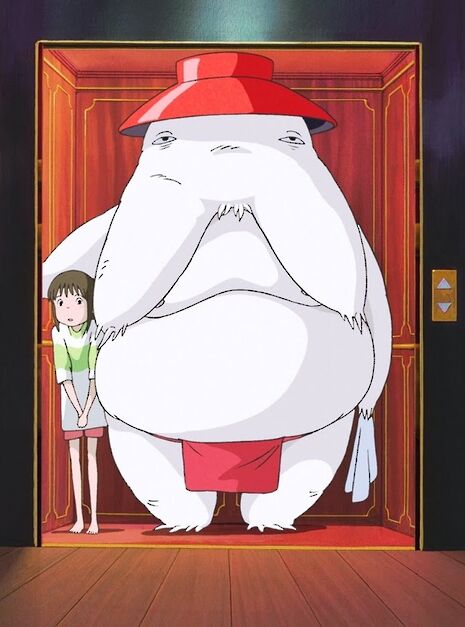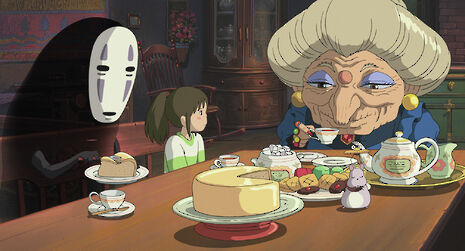Best Animation: Spirited Away
The first category winner to be announced is Miyazaki’s masterpiece. Ian Wang reflects on why it means so much to him, and to a generation of Ghibli fans.

I think I was about 12 or 13 when I first saw a film by Hayao Miyazaki, Spirited Away’s legendary director. I was an ardent animation fan, enjoyed nothing more than escaping into the colourful little universes crafted by Pixar and Dreamworks – but I was trying to broaden my horizons, and wanted to know what all the fuss was with this Studio Ghibli I’d been hearing so much about (“How do you even pronounce that? ‘Gib-lee’?”). 15 minutes into Spirited Away, I had my answer.
“Miyazaki embraces them, inviting us to gaze on in wonder at the ghoulish cavalcade of creatures he parades before us.”
Spirited Away, Ghibli’s most acclaimed film and one of the highest-grossing Japanese films in history, remains the only non-English language film to scoop the Oscar for Best Animated Feature, and is consistently ranked as one of the greatest animated films of all time. Part of the film’s appeal is just how vibrant and scintillating its world is, a magical spirit dimension which our skittish ten-year-old protagonist, Chihiro, finds herself trapped in after her parents are turned into pigs by a big-headed (literally) bathhouse owner called Yubaba.
My preteen self was left slack-jawed by the chaotic, electrifying beauty of that bathhouse, populated by demons, ghosts, river spirits, disembodied heads, and stink gods. While Western animators have tended to distance themselves from the strange and uncanny (try imagining No Face in a Pixar film), here Miyazaki embraces them, inviting us to gaze on in wonder at the ghoulish cavalcade of creatures he parades before us.

What brings me back time and time again to Spirited Away, however, isn’t just its fantastical characters and captivating animation. Spirited Away sticks with me, as it does with many others, because of its unique emotional power. Miyazaki is a deeply, intuitively human storyteller. He’s often thought of as the Japanese Walt Disney, but I think that comparison misses a lot of what makes his films special. The protagonists of Disney films are often a little too perfect to be relatable – they’re princes and princesses, they have magic powers, and, though they might make mistakes, at the end of the day they’re still the Good Guys, opposed to the unequivocally evil Bad Guys. And though you might be moved by their stories, rarely do you ever walk out of a Disney film feeling like you’ve learned something about yourself.
Miyazaki’s protagonists, on the other hand, are far from perfect. Often they’re ordinary people who get caught up in the magical world by accident. They happen to stumble upon the fantastical, as Chihiro does, and have to learn to adapt to a world far beyond their grasp. At the start of the film, Chihiro is terrified, uncertain of herself, seemingly powerless in the face of malevolent, magic-wielding superbeings. When she does have victories, they’re understated – something as small as cleaning a dirty tub is an achievement. And yet, by the end of the film, though she still has no magic powers, she has managed to save both herself and her parents, and has helped many other people along the way. Chihiro helps us realise that we don’t have to be superheroes or demigods to make a difference; if we can tend to our own personal growth, and help people wherever we can along the way, that is more than enough.
“Miyazaki refuses to label people simply as good or bad; he sees the humanity in everybody, and forces us to confront our flaws as well as our virtues.”
Spirited Away also refrains from condemning any one character as evil, emphasising that all of its characters, even its heroes, are flawed. At the beginning of the film, a boy named Haku saves Chihiro from disappearing into the spirit world and helps her escape. As the film goes on, however, we learn that Haku has been acting as a thief for Yubaba, helpless to her control after accepting a position as her apprentice, greedily trying to gain stronger magical powers despite the risks. In the end, Haku is the vulnerable one, and Chihiro has to save him.
Haku and Chihiro are both mixes of good and bad, strength and vulnerability, and every character in the film is like this. Though Chihiro’s parents are supposed to take care of her, it is their greed that turns them into pigs in the first place. Kamaji and Lin, two of the bathhouse’s workers, act prickly to Chihiro when they first encounter her, despite later taking her under their wing. Even Yubaba, the film’s seeming arch-villain, is humanised – it’s hard not to feel for her when she realises her son has gone missing and her gigantic, bouncy head of hair goes flat. Miyazaki refuses to label people simply as good or bad; he sees the humanity in everybody, and forces us to confront our flaws as well as our virtues.

Perhaps the most striking example of this is Spirited Away’s most enigmatic character, No Face. A mysterious, mask-wearing spirit, No Face hovers languidly outside the bathhouse, ignored by everyone except Chihiro, who decides to let him in. He’s clearly deeply grateful, and helps her with her work – but he goes too far, bribing bathhouse workers with fake gold because he thinks it will make them love him and becoming enraged and violent when he realises it will not. No Face is not a bad character, but his understanding of the world is shallow, imagining social relationships as financial transactions. Ultimately, it is Chihiro who is able to calm him, a reminder that she did not help No Face for his money – she did it out of kindness.
It’s characters like this, characters that are as flawed as they are sympathetic, that make sure Spirited Away’s emotional resonances are not easily forgotten. Spirited Away is undoubtedly a children’s film, but unlike any other, it confronts its audience with the challenging parts of our childhood – our insecurity, our cruelty, our greed – as much as it celebrates our strength and our capacity for kindness. The lessons I’ve learned from Spirited Away have stayed with me even as I become an adult, and will continue to be relevant no matter how old I am
 News / Colleges charge different rents for the same Castle Street accommodation2 March 2026
News / Colleges charge different rents for the same Castle Street accommodation2 March 2026 News / News in Brief: waterworks, wine woes, and workplace wins 1 March 2026
News / News in Brief: waterworks, wine woes, and workplace wins 1 March 2026 News / Climate activists protest for ‘ethical careers policy’1 March 2026
News / Climate activists protest for ‘ethical careers policy’1 March 2026 News / Angela Merkel among Cambridge honorary degree nominees27 February 2026
News / Angela Merkel among Cambridge honorary degree nominees27 February 2026 News / Private school teacher who lied about Cambridge degree barred from teaching27 February 2026
News / Private school teacher who lied about Cambridge degree barred from teaching27 February 2026








